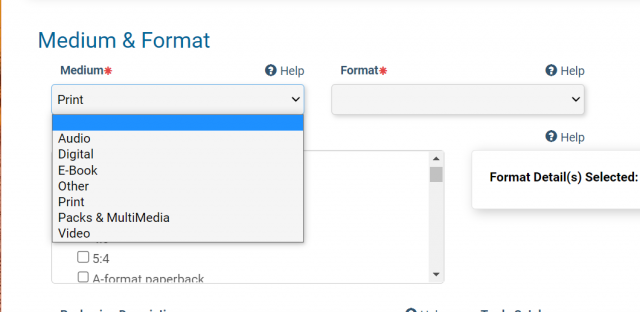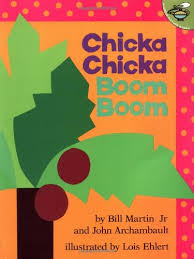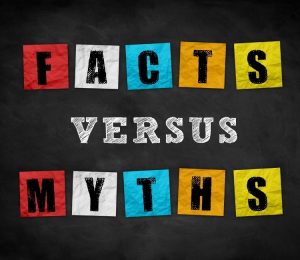The International Standard Book Number, or ISBN, was first devised in 1967. The intent was, and still is, to uniquely identify a specific edition or variation of a book.
Fast-forward to the age of digital reading, and some people have begun calling an ISBN for an eBook an eISBN. The truth is, there is no such thing as an eISBN. An eBook is simply a different variation of a book, just the way a hardcover edition differs from a paperback, or from an audiobook, for that matter.
Bowker’s MyIdentifiers website—the official source of ISBNs for US publishers—allows publishers to choose from seven different book mediums (a form a book can take). Note that an eBook is just one of seven types of mediums in this screenshot from our Bowker account.

There are no “types” of ISBNs! And once you select one of those seven choices in the Medium drop-down, the Format field to the right provides the format options available for the medium you chose.
For example, if you choose Print for the medium, the Format drop-down gives you 16 different types of print books to choose from (paperback and hardcover being the most common).
When does a book need an ISBN, regardless of print or digital?
Bottom-line rule: this is up to the store or distributor that is helping you sell your book or eBook. Here are two examples:
- Amazon does not require Kindle eBooks to have an ISBN when you upload your eBook using KDP. However, if you use Draft2Digital to distribute your book to the Kindle store—or any store they distribute to—it’s Draft2Digital that requires your book to have an ISBN. (You can provide it, or they provide a free one.)
- Your print or eBook, sold from your website, does not require an ISBN. But if you want to sell it in a store, it’s up to the store or distributor (for example, IngramSpark) helping you sell your book as to whether or not your book needs an ISBN.
It is safe to say that all printed books require an ISBN if the publisher wants to sell that book in a store.
Do all types of eBook files use the same ISBN?
Only if they are the same book. Typically, the eBook file (EPUB) uploaded to the major eBook retailers—Amazon, Apple, B&N, Google, Kobo—is the same content. The eBook your reader buys from any of those stores is going to have the same content and display in the same way.
But sometimes this isn’t the case.
Different products require unique identification
Several years ago, the Boston Globe released an eBook titled 68 Blocks. The version in the Apple iBooks store was a completely different product than the eBook in the Amazon Kindle store, although their branding is exactly the same.
The Apple edition was created with the proprietary iBooks Author tool and differs from the Kindle edition significantly. The Apple version makes extensive use of video, while the Kindle version is all text and images. They should have assigned different ISBNs but did not.
Another example is the popular children’s book Chicka Chicka Boom Boom. Purchased from Amazon, the eBook’s text can be enlarged by double clicking, and there is no sound.
Purchased from Apple's iBooks store (at four times the price, as of this writing), the book is enhanced with audio read-along. Both eBooks share the same ISBN, 978-1-4424-3891-0, but again, they should have different numbers.

Contrast these examples with the superb Warner Bros. series Inside the Script (unfortunately, it is no longer available). The differences between the Kindle and iBooks editions were recognized by the assignment of different ISBNs.
If the book differs from another version, regardless of its medium and format, it should have a different ISBN.
Best practices for eBook publishers (and other industry stakeholders)
If you are distributing directly to the major stores, you don’t need an ISBN. If you use an aggregator such as Draft2Digital or PublishDrive, they offer a free ISBN, but user beware.
- Whoever owns the ISBN is technically the publisher.
- Read the fine print. We’ve never seen a contract that allows you to use one company’s ISBN with another service. For example, if you start out by distributing your book using Draft2Digital and use their free ISBN and later want to move your eBook to PublishDrive, your eBook needs a new ISBN. And remember, changing the ISBN might result in a new listing on Amazon and the possible loss of customer reviews.
Frequently Asked Questions
What is an eISBN?
There is no such thing as an eISBN. (Ignore the fact that Google and Kobo use this term.)
What is the difference between ISBN and eISBN?
They are the same. When people or entities mistakenly refer to an eISBN, they just mean an ISBN that’s been assigned to an eBook.
Does an ISBN matter?
The requirement for an ISBN is up to the store or distributor you use to help sell your book. If you want to sell your book through a store or use a distributor such as IngramSpark, it matters a great deal. It nearly always matters for printed books. It’s also required by aggregators such as PublishDrive and Draft2Digital.
Also, the ISBN is tied to a publisher name. Once the ISBN has been assigned to a book, the publisher name cannot change without changing the ISBN. Also read our article, ISBN Essentials: An FAQ for eBook Publishers.
How do I get an eISBN?
Buy ISBNs directly from Bowker via their website, MyIdentifiers.com. In the meantime, please stop putting an “e” in front of ISBN!
Should different eBook file types have different ISBNs?
If the content is different between the books, the answer is yes. For example, if one has pictures and the other is all text, it’s a different book. Or if one has videos and the other doesn’t, it’s a different book. Equally important, make this distinction clear on the cover of the book.
Resources
Articles
ISBN Essentials: An FAQ for eBook Publishers
The ISBN and Self-Publishing: Learn the Essentials in 5 Minutes
Learn more about publishing imprints and ISBNs by visiting this page: What is a book imprint? How is a book publishing imprint name used?
Books
My Publishing Imprint: How to Create a Self-Publishing Book Imprint & ISBN Essentials
Register Your Book: The Essential Guide to ISBNs, Barcodes, Copyright, and LCCNs


Fantastic article David! :)) Thanks a lot – i was absolutly confused when i was reading about a “eISBN” in Kobo… Crasy 😀
Now i can sleep in peace.
Thanks Elisa, I’m glad it cleared things up.
I am converting our paper book to an ebook. I noticed on a Hunger games ebook, that there was an e-isbn number included in the copyright information. Glad to find your information and know that is incorrect!
The correct way is to get a new ISBN for each format I use (EPUB, MOBI). What is the best (and most economical) way to get these numbers? Should the paper format ISBN numbers be referenced when Applying?
Our book currently has an ISBN number for Paperback, one for Hardcover, and also a Library of Congress number. I should also mention that the content will Not change from paper to electronic, but I will not include an index and some of the fonts and formatting etc will obviously change.
Thank you,
Cindie
Hi Cindie. The only official source of ISBNs in the US is Bowker at MyIdentifiers.com. Also, Bowker has changed their position and you do *not* need a separate ISBN for the EPUB and Mobi…just one number will do unless those two files have different content (i.e. one has video embedded and the other doesn’t). If you already have an ISBN, you must have an account with Bowker. Just buy more numbers for that account.
I have recorded a 10 part training video on ISBNs and it covers all this. It is currently free for a limited time. You can learn more at http://www.EpubHelp.com.
I agree with you in part. I agree that different versions/editions of a book need a different ISBN. However, as a matter of our quality control and workflow we create the mobi from the epub, therefore it is the same edition of the book, and we use the same ISBN. We only use different ISBNs as a standard procedure for the enhanced edition, or for a completely different layout (as in the case of an iBooks Author version of the same book).
Yes, that is the accepted best practice now: use the same ISBN if the content is the same. Bowker’s guidance about assigning ISBNs has changed since this post was written. Nevertheless, the publisher may wish to assign unique ISBNs to different formats if they are tracking and reporting sales by format (not unlike how and why a serial number is used). Thanks for sharing your experiences.